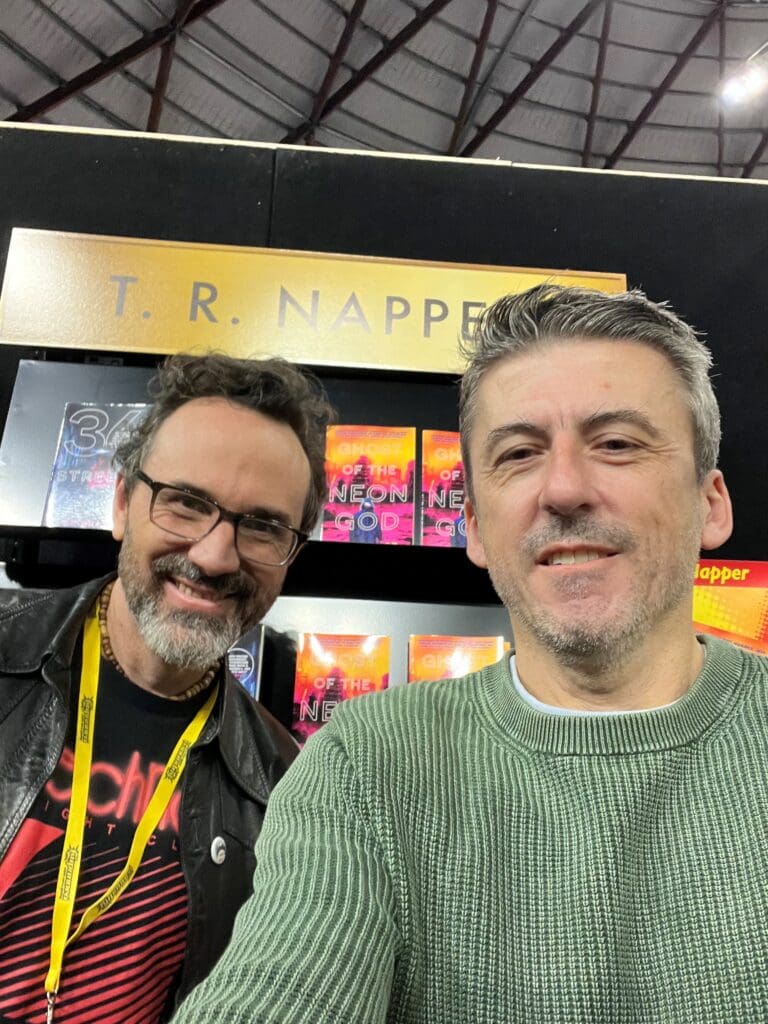
I’ve long been a fan of the cyberpunk genre and during the course of my recent Aussie and New Zealand author showcase I was lucky enough to make contact the multi-award winning Aussie author TR Napper (aka Tim). Author of 36 Streets, Neon Leviathan, Bishop and of course the newly released Ghost of The Neon God.
I had the real pleasure of meeting Tim at the recent Supernova Convention in Sydney (see above), in addition to grabbing a signed copy of the Ghost of The Neon God, I was able to twist his arm into agreeing to an interview. So a huge thanks to Tim for his time and brilliant answers. I hope you enjoy the interview and do go check out Tim’s work if you haven’t already.
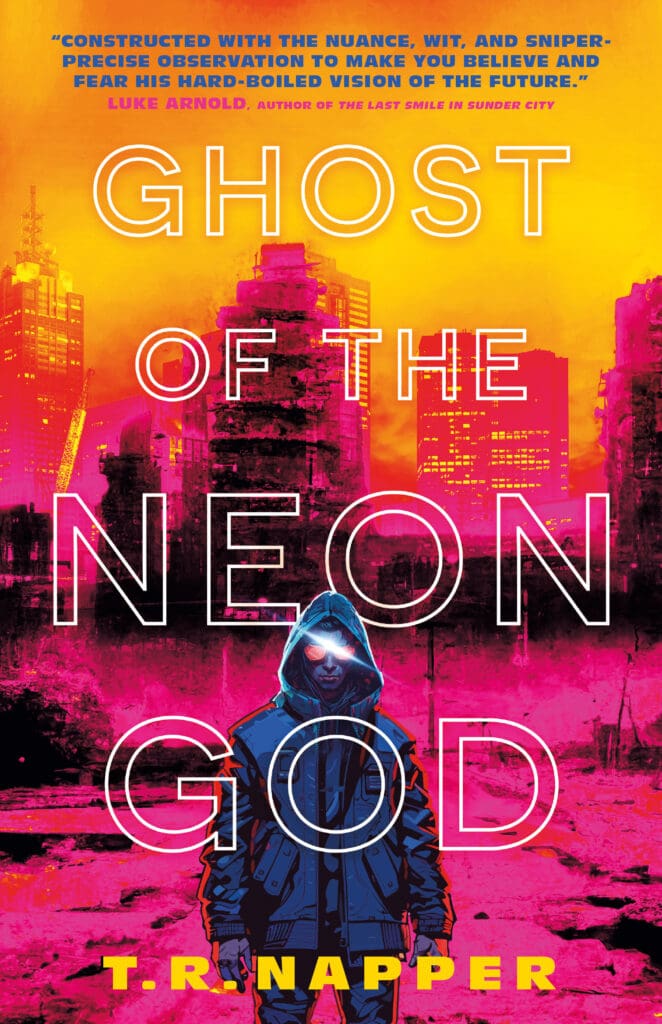
- What started you on your writing journey?
I’m not precisely sure. I was always a voracious reader, right from a very young age (always a good sign), but had no desire to write novels. Or, to be more precise, never imagined I could write a novel. So much so I didn’t even daydream about it, never even held some secret desire.
So I did many other things, ending up as an aid worker living throughout Southeast Asia, which was all-consuming for a decade. In my thirties I was living in Hanoi, taking care of my (then) infant son, having a break from aid, when the writing bug hit. More than a bug, an obsession. I threw myself into it and never looked back.
- Are there any particular themes that you find yourself returning to?
Memory in particular is something I have returned to time and again. It’s everything we are: our fears and loves, the most important episodes of our life, our relationship with the world around us, everything is shaped and contained in memory. If we lose it, we are nothing – an empty vessel. In a way it’s a metaphor for our soul.
Yet at the same time it is so fallible, so vulnerable to time, to error. Cyberpunk as a genre has the perfect tools to explore the manipulation of memory – editing, deletion, false memories. The story implications are myriad, the philosophical dimensions fascinating.
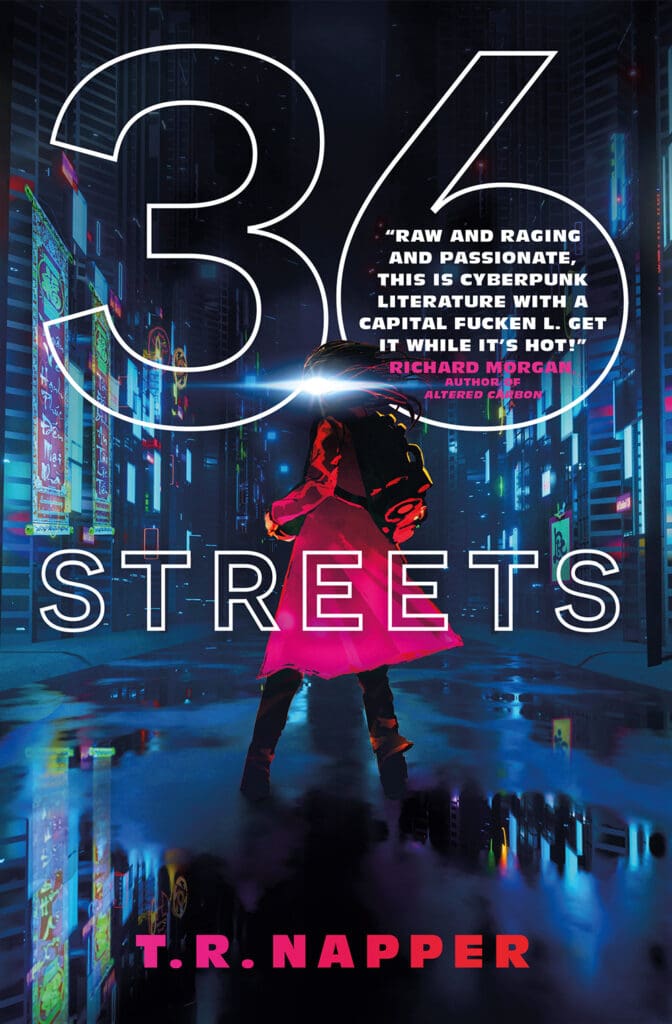
- I noted that you have a quote from Richard K Morgan in front of your book 36 Streets. I loved Altered Carbon when I read it and enjoyed the subsequent TV series. Would you like to have any of your work adapted for large or small screen and would you want to keep a close creative control on the production of it?
Goddamn right I would. My work would be perfect for an anime, or for streaming. As for creative control? Well, that hypothetical is what we would call a good problem. American author Tim Powers said to me that if it were ever happen, you’d either want complete creative control, or none. He had one of his books, On Stranger Tides, made into a Pirates of the Caribbean movie – the screen version bore no resemblance to his novel. He simply took the money, and let it go.
I’m not quite sure I’d be as sanguine as Powers. Ideally I’d want creative control, or at least give it over to people I knew understood and loved the work.
But, look, as intoxicatingly self-indulgent as it is for me to delve into such possibilities, the chances are very slim. Nice to dream though, hey?
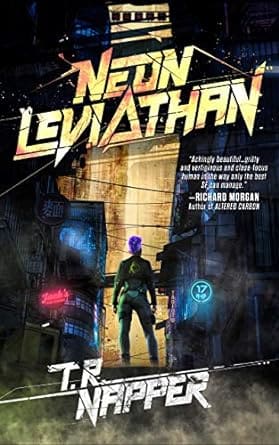
- 36 Streets, Neon Leviathan and The Escher Man (later 2024 release) are set in Southeast Asia, where I know you spent time living and working. And Ghost of a Neon God is set in Australia. Do you think an author needs to have lived in a place or city in order to base their books there, assuming they set in a real world location?
I have to, but I don’t think other authors need to. Many good works, set in diverse cultures and settings, have been written by authors with little experience of them. Personally, however, I find it necessary. The sense of place I replicate in 36 Streets (of the Old Quarter in Hanoi) is something praised time and again by readers, including by Vietnamese readers. I could never have done that without living there.
I am fortunate to have lived and worked in some extraordinary and complex cultures before I became a writer (and also when I started writing, in the case of Vietnam), and have used this to inform and enrich my worlds. I’m a better author for these experiences.
- Did you have any concerns that your non-Australian readers would struggle to conceptualise some of the more unique Australian settings? I may add as a “local” I loved having a book set in places I’ve been to or which familiar to me.
I always think of the reader, but never think of the audience. By that I mean, I constantly think about the reading experience. Have I described this character well? Have I sufficiently foreshadowed the twist? Have I engaged the senses?
But I never coddle an audience, or dumb down my work. I trust the reader. Not all creatives do – filmmakers in particular, and I understand why (the reasons are mainly financial). I understand, but dislike it.
I’d never compromise on my choice of setting, whether Australia or Southeast Asia. Readers are smart, and science fiction readers in particular like to encounter the new. I don’t try to be obscure – as I said, I constantly think about the reading experience. But ultimately, Australia has a unique culture and distinct environment, and I’m not going to shy away from that. I trust my readers, wherever they are from, to be able to fall into the worlds that I create.
- A central theme in Ghost of a Neon God is the emergence of AI, it’s a proper sentient entity which makes the current crop of “AI” programs we have look like Tetris by comparison. Do feel that “true AI” could be a not too distant reality or is it still more in the realms of science fiction?
I wouldn’t want to give a prediction on this, as I’m not an expert. But I’ll make two observations. One, is that many of the scientists involved with AI have something of a religious fervour. ‘The Singularity’ is up there with some biblical revelation of a greater and more enlightened being. We keep being told that the second coming is coming, but the date seems forever pushed back. It’s always, as one of the leading AI researchers have quipped, ‘five to ten’ years away.
Two, Artificial General Intelligence (AGI) – that is, an intelligence that is very good at a diverse range of tasks, rather than just a single task –needs sentience. Current AI has no more understanding of what it is doing, as does a toaster its relationship to bread. The hard problem is that consciousness is not well-understood, even by neuroscientists today. What is the formula for consciousness? For free will? They haven’t a clue. Where is consciousness located? They don’t even know that.
It has become an article of faith. Somehow, consciousness will suddenly emerge from a machine like god from a cloud. How? They can’t possibly answer, except without jumps of logic that are more akin to religious belief than to science.
- The central protagonists in Ghost of Neon God have a real world depth and realism to them, how do you go about the creation of your characters?
Thank you.
Ah, that is a tough question. Character is always of central importance to me. I spend a lot of time thinking about their backstory, their motivations, their secrets. When I do write them, I take time to make sure they act consistent with their backstory, that they speak and behave in a way that seems real and true. Whenever I edit, I ask myself these questions again and again.
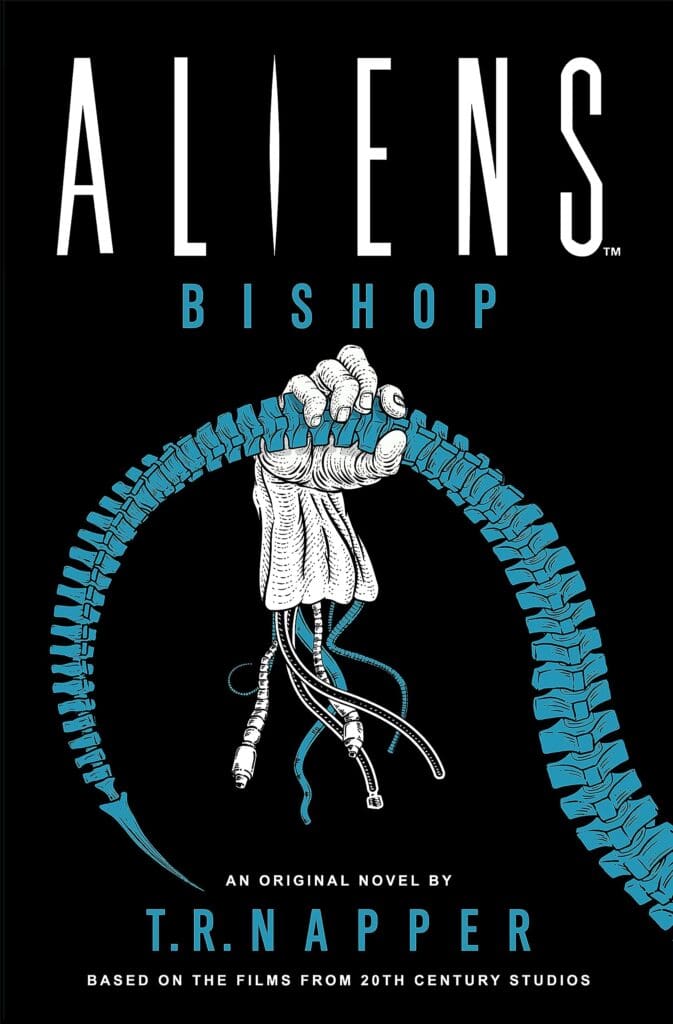
- Your recently published Bishop, set in the Alien franchise / world. How intimidating was it to step into an existing franchise / fanbase? And did your approach to this book differ greatly from your other work?
Well I had to write it a helluva lot faster, for starters. I usually take 3 – 5 years to write a novel. Bishop had a deadline of 5 months. That was the most intimidating part.
Somehow, not until it was published, really, did it hit home that I was creating canon. I somehow didn’t connect the dots: Aliens was a film that I loved when I was young (too young, actually, to see it at the time), and Bishop one of the characters (among an exceptional ensemble cast) that had stuck with me for decades. I didn’t quite get that there was a massive and dedicated fanbase (although they certainly made themselves known once it was released). Only once the book was in my hand did it seem real.
My goal was to write something I was proud of, something worthy of the best of Aliens, and that would do justice to the character of Bishop. I hope I achieved that. So far, the book has been embraced by the Aliens community.
- I read one of your other interviews that you adhere to the maxim of Ursula Le Guin: ‘science fiction is not predictive, it is descriptive’. How much research you do in respect of the science and technology in your books?
Enormous amounts. The start of a new project will involve at least ten works of fiction and non-fiction, but more likely twenty. This is to say nothing of the online research, the articles, papers, journals, or the occasions when I discuss aspects of the story with an expert.
- I recall from a recent conversation we had that you’re fan of the hard -boiled genre, which I can definitely pick up from your work I’ve read to date. Are there any favourites from the genre that are a particular influence for you or that you would recommend for those keen to dive in?
Dashiell Hammett is the original and the best. He established the hardboiled genre of fiction, and in my view is prose is unsurpassed. My favourites of his are Red Harvest and The Maltese Falcon.
Peter Temple was an Australian crime writer, and one of the greats. His Jack Irish series is very good, as is his most celebrated work, The Broken Shore. Megan Abbott writes some great hardboiled fiction, in an old-school way, but from the female perspective. I particularly liked Queenpin.
The Burnt Orange Heresy by Charles Willeford is excellent, as is The Postman Always Rings Twice (James M Cain), Winter’s Bone (Daniel Woodrell), Digger’s Game (George V Higgins), The Rules of Backyard Cricket (Jock Serong), and Strangers on a Train (Patricia Highsmith).
- What does the next 12 months have in store for your writing and are there any future publications that you’d like to tease your readers with?
Currently I’m working on a science fiction short story, that became a novella, that in turn became a novel. I was inspired to write it while in Japan. It has mecha and modernist poetry and simulation and conspiracy and high-tech warfare. For starters.
AUTHOR BIO:
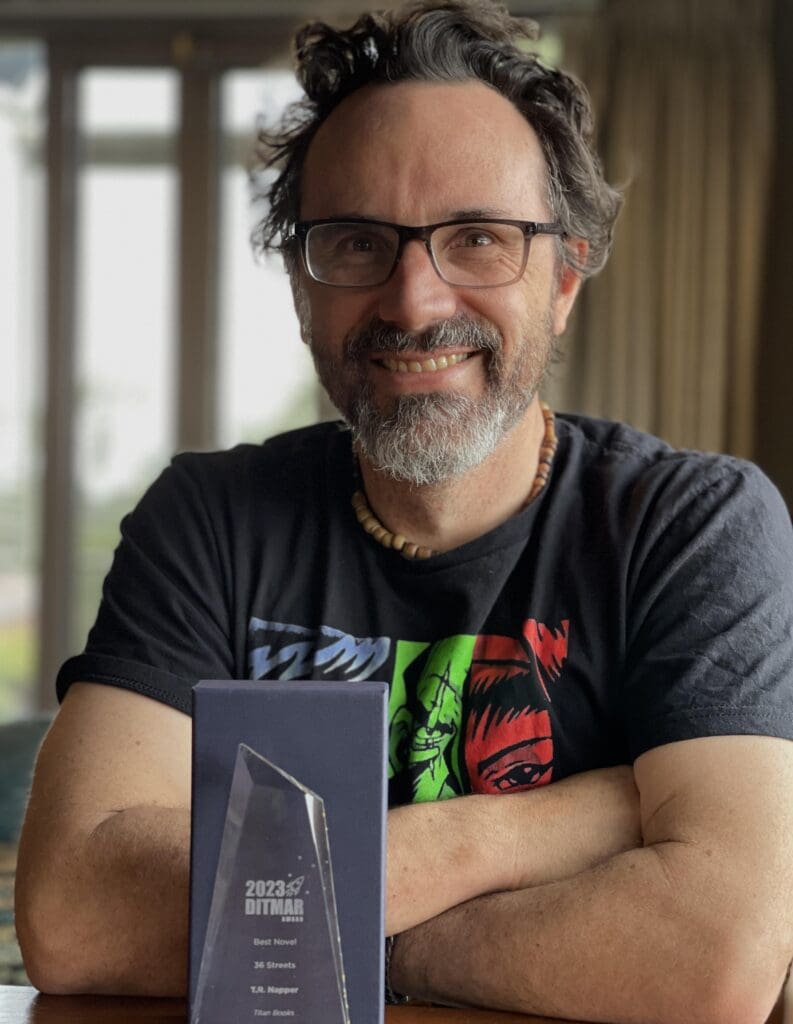
T. R. Napper is a multi-award-winning science fiction author. His short stories have appeared in Asimov’s, Interzone, the Magazine of Fantasy & Science Fiction, and numerous others, and been translated into Hebrew, German, French, and Vietnamese. He received a creative writing doctorate for his thesis: Noir, Cyberpunk, and Asian Modernity.
Before turning to writing, T. R. Napper was a diplomat and aid worker, delivering humanitarian programs in Southeast Asia for a decade. During this period, he received a commendation from the Government of Laos for his work with the poor.
Napper was a resident of the Old Quarter in Ha Noi for several years, the setting for his debut novel, 36 Streets. These days he has returned to his home country of Australia, where he works as a Dungeon Master, running campaigns for young people with autism for a local charity
Links & Socials:
Links to current book/ series:
My website has(www.nappertime.com) links to all the places you can buy my books. Well, my two books. Neon Leviathan (a short story collection), and my debut 36 Streets. The later won both the Aurealis Award for Best SF Novel, and the Ditmar Award for Best Novel. Huge honour to win the double, and I’m immensely proud the critical reaction to my debut has been so positive.
Website / Social media links:
Twitter: @TheEscherMan
Instagram: https://www.instagram.com/trnapper/
Bluesky: @trnapper.bsky.social
Facebook: https://www.facebook.com/trnapper
Website: www.nappertime.com

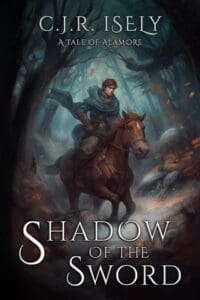
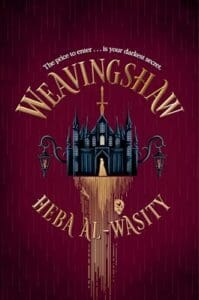
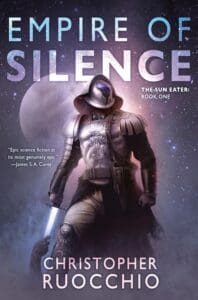
Leave a Reply